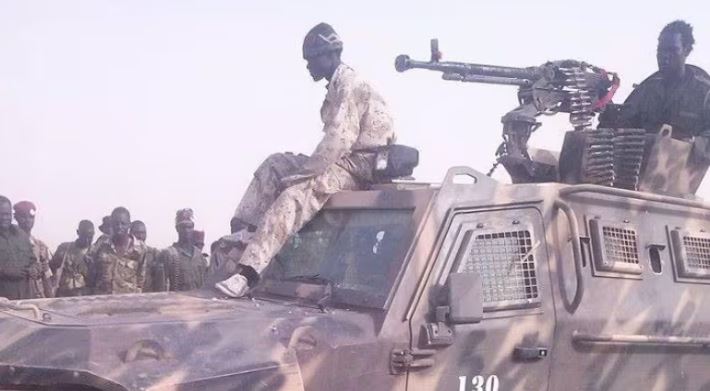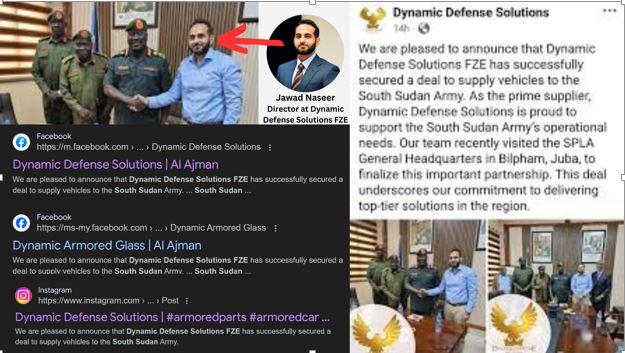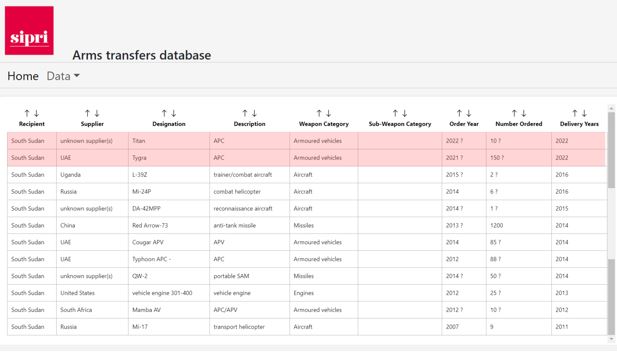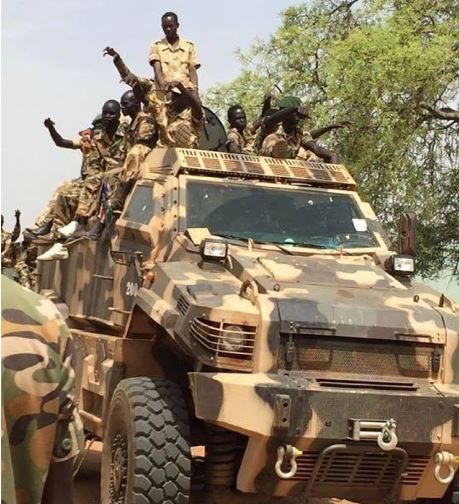BY ATAK NGOR
Since the United Nations Security Council (UNSC) imposed an arms embargo on South Sudan in 2018, government officials have continued to commit extrajudicial killings, state-sponsored war crimes, widespread attacks against civilians, and serious human rights violations. Key senior government officials have also facilitated the ongoing flow of weapons and ammunition, as documented in the 2023 UN inquiry report.
As if it were business as usual, not a single person has been held accountable, and the credibility of South Sudan’s government continues to fall faster than the exchange rate of its currency.
In July 2018, the UNSC imposed an arms embargo on South Sudan in response to ongoing hostilities and peace agreement violations. However, it appears the Government of South Sudan has continued to secretly purchase and receive weapons, ammunition, and other military hardware, despite the continuous yearly renewal of the arms embargo. One of the countries that has continued to supply vehicles to the South Sudan People’s Defense Forces (SSPDF) is the United Arab Emirates (UAE). In August 2024, a company in the UAE known as Dynamic Defense Solutions FZE announced on its social media handles that it had “secured a deal to supply vehicles to the South Sudan Army.” SSPDF spokesman Maj. Gen. Lul Ruai Koang, speaking to Radio Tamazuj, denied the deal stating, “Officials from the company met our Director-General for Procurement, the Assistant Chief of Logistics, and the Director for Maintenance.”
“The officials from the company outlined their capability in terms of the services they were able to offer,” he added. “No deal was reached.” This statement is categorically inaccurate because the company said that their visit to the SSPDF General Headquarters was to “finalize this important partnership.” There may be no deal, but there was a partnership.
Why are senior government generals meeting with officials from this company if not to secure a deal or a partnership? How often do senior generals meet with companies like this? The truth is that the government got caught with its hand in the cookie jar and could not fully dispute it because there were photos of SSPDF generals and the company’s officials together.

I reached out to Dynamic Defense Solutions for answers about the partnership with the Government of South Sudan but my questions went unanswered at first. Instead, I was told, “We have already replied to [the] UN Mission on this.” I was then advised to ask the UN, without being given any details about whom to contact. Dynamic Defense Solutions’ Director, Jawad Naseer, refused to answer any of my questions, including whether the company had already delivered vehicles to South Sudan’s military. Strangely, Naseer also demanded my identification card details, which I politely declined to provide as they could share them with South Sudanese officials to perhaps facilitate an arrest.
After providing my name and engaging in further discussions, the director told me, “We need to consult with our legal team [on] how to respond to you on this.”
In August 2024, Dynamic Defense Solutions shared on its social media that they have “successfully secured a deal to supply vehicles to the South Sudan Army.”
“As the prime supplier, Dynamic Defense Solutions said is proud to support the South Sudan Army’s operational needs,” the company posted. “Our team recently visited the SPLA General Headquarters in Bilpham, Juba, to finalize this important partnership. This deal underscores our commitment to delivering top-tier solutions in the region.” These posts have since been deleted from the company’s Facebook, Instagram, and LinkedIn pages.

When confronted about the screenshots by putting the quote into Google, and posts from their social media still showed up, Naseer said, “The written text in the post is AI-generated.” If it is AI generated, how are there still traces on Google, including from Naseer’s personal LinkedIn post about the deal? Furthermore, when I asked if any member of his company visited South Sudan to discuss the deal with representatives of the South Sudan Army, Nasser responded, “Yes.” Our scribe then asked if Dynamic Defense Solutions ever posted on social media about securing partnerships to supply vehicles to the South Sudan Army. He responded, “Yes, but never mentioned that any agreement or memorandum of understanding was signed.”
And yet, Naseer still claims the text is AI-generated, despite members of his company visiting the SSPDF Headquarters in Juba, South Sudan, posting about securing partnerships to supply vehicles to the army, taking photos with senior SSPDF generals in Juba, and their social media stating, “Dynamic Defense Solutions FZE has successfully secured a deal to supply vehicles to the South Sudan Army,” and the their “team recently visited the SPLA General Headquarters in Bilpham, Juba, to finalize this important partnership. This deal underscores our commitment to delivering top-tier solutions in the region,” in a now-deleted social media post. This partnership was a match made in heaven.
Evidence of South Sudan’s breaching of the arms embargo
When you search for weapons received by South Sudan since 2011 in the SIPRI Arms Transfers Database, which is updated annually and contains information on all transfers of major conventional arms, it shows some arms transfers that were delivered to South Sudan, including from Russia, the United States, China, and the UAE. However, the UN arms embargo, indicated that 150 armored vehicles were delivered to South Sudan from the UAE in 2022, which had been ordered in 2021. It also indicates 10 more deliveries from an unknown supplier, ordered in 2022 and delivered the same year.

South Sudan’s credibility crisis
In 2021, Government of South Sudan officials such as Deputy Juba City Mayor Thiik Thiik Mayardit and Information Minister Michael Makuei Lueth threatened people who wanted to peacefully protest that the government does not have “rubber bullets” and only has live ones. This was supported by Senior Presidential Advisor Gen. Kuol Manyang Juuk who said that the government has at least warned the demonstrators that it does not have tear gas and urged protesters to stay at home to avoid injuries. On the other hand, when the unified soldiers were being deployed last year, Minister Makuei said, “Deployment of the trained forces will proceed, but regrettably, they will be equipped with sticks.” However, when there is a protest, the government has guns and live bullets.
On 4 October, SSPDF mouthpiece Gen. Koang dismissed social media reports of changes at the top command of the Tiger Division which protects President Salva Kiir, which claimed that Maj. Gen. Abraham Gum Makuac took over from Maj. Gen. Lual Week Kuem, better known as Lual Maroldit. However, on 10 October, the SSPDF spokesperson admitted that the social media rumors were true. The public learned about the changes at the helm of the Tiger Division and exactly who the new commander would be before the SSPDF’s spokesperson dismissed the public and media, only to confirm the facts less than one week later. These are major blows to the credibility of the SSPDF and the government at large.
The UN arms embargo on South Sudan is not working as the government can access weapons and ammunition. The UN has documented that civilians have continued to be deliberately targeted and killed by government-aligned forces, and key senior government officials have facilitated the ongoing flow of weapons and ammunition into civilian hands, suggesting that the arms embargo has not fully worked. When the government is caught red-handed, they simply deny the facts and gaslight the media and the public with their shady partners in crime, such as Dynamic Defense Solutions. As millions of South Sudanese continue to suffer from floods, insecurity, unpaid salaries for around 12 months, and a lack of basic services, government officials remain far away in their hotels in Juba, while their families live in absolute luxury in neighboring countries with resources looted from the country.
The writer is an investigative reporter and can be reached via atakngor97@gmail.com.
The views expressed in ‘opinion’ articles published by Radio Tamazuj are solely those of the writer. The veracity of any claims made is the responsibility of the author, not Radio Tamazuj.




